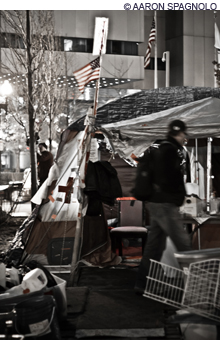"I really hate the cops," he says. "That is actually a really large driving motivation for me, is that I really hate the cops and frequently find myself in positions of direct and/or violent conflict with them. And being able to neutralize some of their force or make it so that me and my friends and my comrades can go hard against the cops and know we can take care of each other when shit goes bad is a very strong motivation. On a broader scale, I'm working for the abolition of capitalism and overthrowing the government . . . and using my street-medic work as a help to that."
"These are skills that should be taught in school, should be taught to kids,"says "Charlotte," another Allston-based medic, who has a master's degree from Cornell in international agricultural development and has worked in sub-Saharan Africa with the UN World Food Program. "They're really easy things that make your life a lot better, and they shouldn't be reserved for some elite group of people who are able to access all of these trainings and then don white coats and uniforms and create this separation."
But to an extent, street medics are putting on uniforms. They wear red-cross insignia and distinguish themselves from other protesters, holding themselves out as a medical resource. So do Good Samaritan laws apply to them? Depends who you ask.

"The Occupy Movement has brought street medics into an unprecedented spotlight." |
STREET LEGALGood Samaritan laws exist to protect civilians who spontaneously attempt to help others who appear to be helplessly in danger. For example, if you're giving CPR to a stranger whose car accident you happened to witness, you can do so without worrying that they'll sue you if you accidentally crack a rib doing chest compressions.
Vickie Sutton, a professor at Texas Tech University School of Law, is the author of the book The Good Samaritan Laws and director of the Good Samaritan Law Project. She says that, with these laws, there may be different standards for volunteers who are training themselves and marking themselves as medics, than laws pertaining to bystanders and random civilians.
"If you're calling yourself a street medic, you have more of a duty to be prepared and trained," says Sutton. "You're more likely to incur liability for gross negligence because you probably have more of a duty to have education if you hold yourself as a street medic."
Plus, she says, the laws vary from state to state.
"Say a street medic from Massachusetts goes to Connecticut," she says. "They're subject to a whole new set of laws. When you have volunteers that come from a distance to help at a protest, all of these people are going to be completely unaware of laws in a new state."
So street medics could be exposing themselves to lawsuits if they mess up. But at least as far as the Boston Police are concerned, what medics are doing is not actually illegal. "Self-appointed medics would be subject to the same laws and expectations as the general public during the course of a police incident," says Elaine Driscoll, the BPD's spokeswoman.